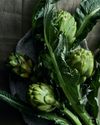
There are 1700 native species of bees in Australia, as well as the introduced species: the European honeybee, Apis mellifera. Sure as hell, at least one of these bees stung you as a child: perhaps while running under the sprinkler in the hot January sun, at the local swimming pool or playing backyard cricket. More often than not, being stung by a bee is a human’s first encounter with the tiny, diligent insects that waggle-dance from plant to plant, flower to flower, pollinating a massive one-third of the world’s food supply in the process. Some of them sting. But there are plenty of other reasons to look out for them, too.
BEES ARE AT MAJOR RISK
Global bee populations have been in decline for years. Varroa mite disease is one of the biggest causes: a tiny parasite with the power to unravel our entire food system. Australia is one of the only varroa-free zones in the world, and so far it's managed to avoid the mite and colony collapse disorder (where entire hives are wiped out overnight). “We still have great, healthy colonies and the best conditions for honeybees anywhere on earth,” says urban beekeeper Nic Dowse, founder of Melbourne creative studio, Honeyfingers. “But how can we keep it that way? It’s all about communication.”
BEES ARE COOKS
Dowse produces small-batch, raw honey in urban hives across Melbourne, and his studio works to educate people on the collective intelligence of bees and their importance to our food system. One of his favourite topics is how bees cook and ferment their own food, just as humans might bake sourdough bread or turn surplus cabbage into kimchi. "A beehive is a very warm and humid place, about 35 degrees, and any food would spoil at that,” Dowse says. “The bees ferment their pollen to control the decay rate. It’s a lactic-acid ferment and the same process humans use to make bread.”
Bu hikaye Gourmet Traveller dergisinin February 2020 sayısından alınmıştır.
Start your 7-day Magzter GOLD free trial to access thousands of curated premium stories, and 9,000+ magazines and newspapers.
Already a subscriber ? Giriş Yap
Bu hikaye Gourmet Traveller dergisinin February 2020 sayısından alınmıştır.
Start your 7-day Magzter GOLD free trial to access thousands of curated premium stories, and 9,000+ magazines and newspapers.
Already a subscriber? Giriş Yap

From personal experience
Former Hope St Radio chef ELLIE BOUHADANA invites you to gather your loved ones and enjoy an evening of good food and laughter with recipes from her new cookbook, Ellie's Table.

Kimberley Moulton
Kylie Kwong celebrates the individuals helping to grow a stronger community. This month, we applaud the international curator and Yorta Yorta woman who is shining a light on First Peoples.

Tom Wallace
We share a drop with the head winemaker for Devil's Corner, Tamar Ridge and Pirie Sparkling, a master of cool-climate grapes.

Best in class
The top drops to keep an eye out for on wine lists (and why they're worth the splurge)

A taste of refuge
Fleeing war and persecution, Australia's new arrivals push our food culture forward. DANI VALENT explores the contributions of the country's refugee communities.

BE OUR GUEST
Inspired by the sense of place conjured by Europe's Michelin-star restaurants, local restaurateurs are expanding their hospitality remit to include accommodation

Barcelona BUZZ
A popular drawcard for digital nomads and expats alike, the Catalonian capital offers equal parts sophistication and fun. Here, DANI VALENT discovers the latest dining hotspots.

HEATHCOTE BOUND
MICHAEL HARDEN hits the road to explore regional Victoria's Heathcote, home to this year's Best Destination Dining and a host of other delights.

The art of...relishing restaurants
Does working in hospitality make someone a better or worse diner

HEART AND SOUL
Not a vegetable but rather a flower bud that rises on a thistle, the artichoke is a complex delight. Its rewards are hard won; first you must get past the armour of petals and remove the hairy choke. Those who step up are rewarded with sweet and savoury creaminess and the elusive flavour of spring. Many of the recipes here begin with the same Provençal braise. Others call on the nuttiness of artichokes in their raw form. The results make pasta lighter and chicken brighter or can be fried to become a vessel for bold flavours all of which capture the levity of the season.